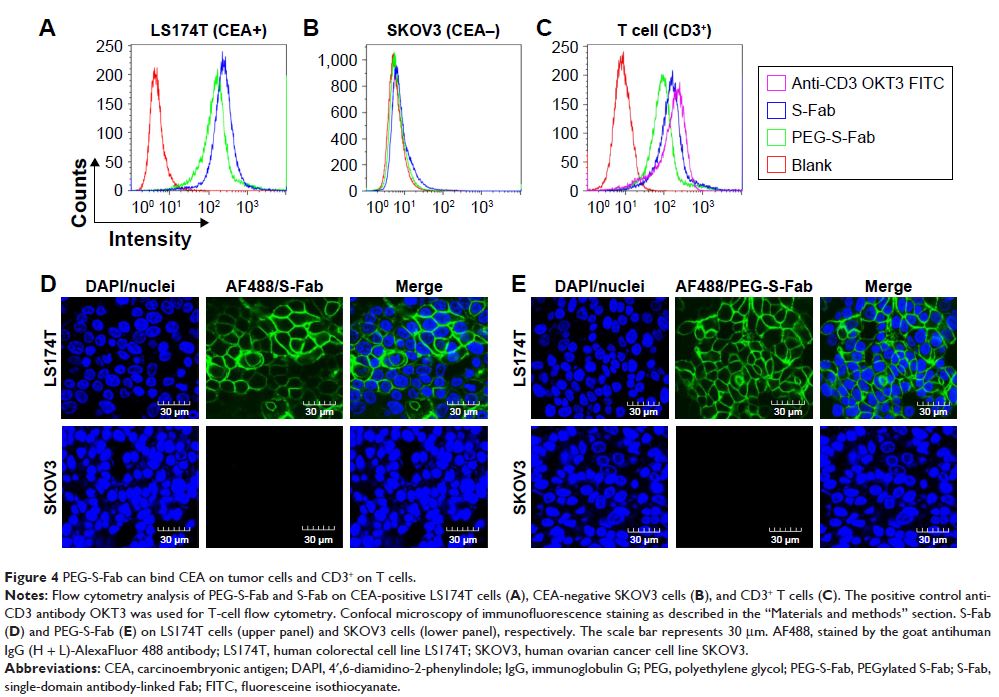108985
论文已发表
注册即可获取德孚的最新动态
IF 收录期刊
- 3.4 Breast Cancer (Dove Med Press)
- 3.2 Clin Epidemiol
- 2.6 Cancer Manag Res
- 2.9 Infect Drug Resist
- 3.7 Clin Interv Aging
- 5.1 Drug Des Dev Ther
- 3.1 Int J Chronic Obstr
- 6.6 Int J Nanomed
- 2.6 Int J Women's Health
- 2.9 Neuropsych Dis Treat
- 2.8 OncoTargets Ther
- 2.0 Patient Prefer Adher
- 2.2 Ther Clin Risk Manag
- 2.5 J Pain Res
- 3.0 Diabet Metab Synd Ob
- 3.2 Psychol Res Behav Ma
- 3.4 Nat Sci Sleep
- 1.8 Pharmgenomics Pers Med
- 2.0 Risk Manag Healthc Policy
- 4.1 J Inflamm Res
- 2.0 Int J Gen Med
- 3.4 J Hepatocell Carcinoma
- 3.0 J Asthma Allergy
- 2.2 Clin Cosmet Investig Dermatol
- 2.4 J Multidiscip Healthc

一个抗 CEA/CD3 的双特异性抗体的位点特异性聚乙二醇化可改善其抗肿瘤效力
Authors Pan H, Liu J, Deng W, Xing J, Li Q, Wang Z
Received 4 February 2018
Accepted for publication 13 April 2018
Published 29 May 2018 Volume 2018:13 Pages 3189—3201
DOI https://doi.org/10.2147/IJN.S164542
Checked for plagiarism Yes
Review by Single-blind
Peer reviewers approved by Dr Mohankandhasamy Ramasamy
Peer reviewer comments 4
Editor who approved publication: Dr Lei Yang
Introduction: Bispecific antibodies that engage immune cells to kill cancer cells are
actively pursued in cancer immunotherapy. Different types of bispecific
antibodies, including single-chain fragments, Fab fragments, nanobodies, and
immunoglobulin Gs (IgGs), have been studied. However, the low molecular weight
of bispecific antibodies with single-chain or Fab fragments generally leads to
their rapid clearance in vivo, which limits the therapeutic potential of these
bispecific antibodies.
Materials and methods: In this study, we used a site-specific
PEGylation strategy to modify the bispecific single-domain antibody-linked Fab
(S-Fab), which was designed by linking an anticarcinoembryonic antigen
(anti-CEA) nanobody with an anti-CD3 Fab.
Results: The half-life (t 1/2) of PEGylated S-Fab (polyethylene glycol-S-Fab)
was increased 12-fold in vivo with a slightly decreased tumor cell cytotoxicity
in vitro as well as more potent tumor growth inhibition in vivo compared to
S-Fab.
Conclusion: This study demonstrated that PEGylation is an
effective approach to enhance the antitumor efficacy of bispecific antibodies.
Keywords: Fab, nanobody,
PEGylation, bispecific antibody, half-life, CEA
